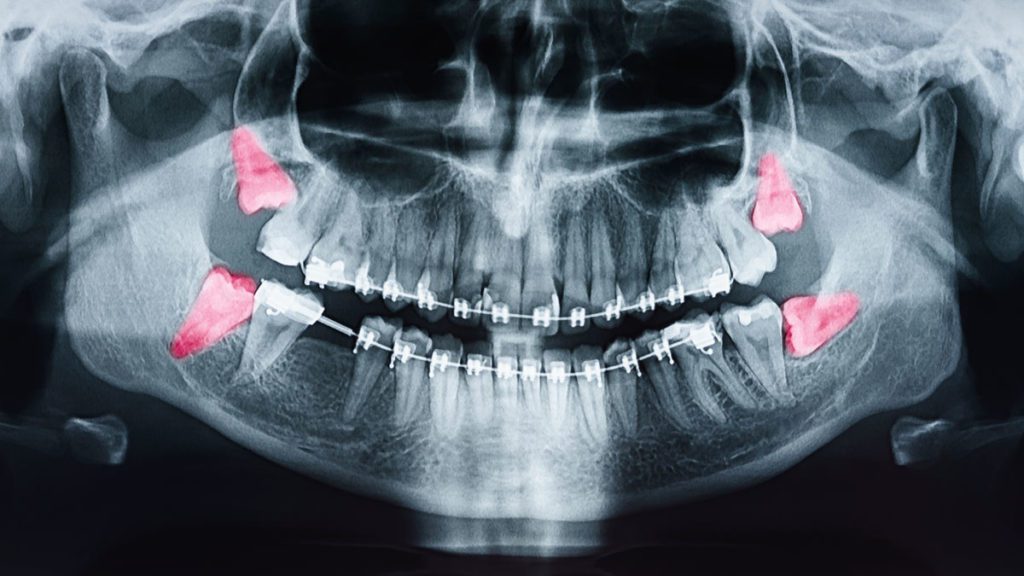
Wisdom teeth, or the third molar, generally have no function in humans, yet an estimated 95% of 18-year-olds have them. However, the likelihood that these teeth will ever become functional is nominal at best. Because of this, wisdom teeth extractions have become common place for teens and people in their early 20s.
Why Should You Have Your Wisdom Teeth Extracted?
The reality is that humans evolved out of their need for wisdom teeth faster than they could evolve out of wisdom teeth themselves. We haven’t needed them for thousands of years. We are evolving out of them, if slowly, as a small percentage of people have no wisdom teeth at all, and others do not have a full set.
That said, most people do in fact have at least one wisdom tooth, and that can be enough to cause problems. Human anatomy is such that the jaw is either too small, or the teeth are too big for the jaw. This can cause wisdom teeth to come in sideways, only partially emerge from the gums (partially impacted) or get trapped in the gums (impacted). This can cause a multitude of problems including infection, inflammation, cysts, tooth decay, and gum disease.
In the majority of cases, the longer you wait to have your wisdom teeth removed, the more likely you are to become symptomatic. Wisdom teeth extraction alleviates symptoms, and acts as a preventative measure so that the symptoms never appear.
When Should You Have Your Wisdom Teeth Extracted?
For most people, wisdom teeth come in between the ages of 17 and 25. Regular dentist visits are imperative during this time, so that your dentist can keep an eye on your x-rays and the general state of your oral health. They will know if your wisdom teeth will eventually cause problems for you, or if you are one of the lucky few where your wisdom teeth will come in normally without any issue.
Wisdom teeth extractions are more involved both medically and financially than other tooth extractions, so discuss your options for your best oral care with your dentist. Once your dentist recommends extraction, it’s best to have them extracted soon after, though you should plan for a least a few days of recovery time, with more time needed the more impacted your wisdom teeth are.
Where Can You Have Your Wisdom Teeth Extracted?
In general, wisdom teeth extractions are considered an oral surgery, which falls in the domain of oral surgeons. However, many dentists, including our own Dr. Lopez, have undergone special training specifically for wisdom teeth extractions, and they can help with all types of wisdom teeth extractions.
How to Prepare for a Wisdom Teeth Extraction
Before your surgery, make sure you have discussed all your questions with your Dentist. Wisdom Teeth Extraction questions you could ask include:
- How many wisdom teeth are being extracted?
- What kind of anesthesia will be used?
- How complicated is the procedure expected to be?
- How long will the procedure last?
- Is there existing damage from any impacted teeth?
- What is the expected recovery and healing time?
You will receive instructions from your dentist on what to do the day before and the day of your procedure. They will include answers to the following questions:
- Whether you will need to plan for someone to drive you home after the procedure
- When you should arrive at the dental clinic
- Any fasting instructions, including when you need to begin.
- Whether prescription drugs can be taken before the procedure, and how far in advance they should be taken
- Any non-prescription drugs you should avoid completely before your procedure.
What Happens During the Wisdom Teeth Extraction Procedure?
Depending on the complexity of your case, your dentist may recommend different anesthetics. These can include a local anesthetic, sedation anesthesia, or for very complex cases, general anesthesia.
During a typical wisdom teeth extraction your dentist does the following:
- Make an incision in the gum to expose the tooth and jaw bone
- Remove any bone that blocks access to the wisdom tooth root
- Divide the tooth into sections if it’s clear that it will be easier to remove in pieces
- Remove the tooth
- Clean the now-vacant site of the removed tooth of any leftover debris from the tooth or bone
- Stitch the wound closed to promote healing, if necessary
- Place gauze over the extraction site to help control bleeding and to help a blood clot form
What Happens After the Wisdom Teeth Extraction Procedure?
After your procedure, you should plan for at least 2-3 days of recovery time, with the first 24 hours being the most important. During this time, drink only water, and avoid hot beverages, soft drinks, alcohol and caffein. Do not drink through a straw, as the suction created can dislodge the blood clot in your incision(s)
You can return to normal activity the day after your procedure but avoid strenuous activity for at least a week.
Swelling in the mouth, face, and neck is normal for up to 10 days after the procedure and can be treated with a cold compress.
You should not need a follow-up appointment, but call your dentist if any of the following symptoms:
- Difficulty swallowing or breathing
- Excessive bleeding
- Fever
- Severe pain not relieved by prescribed pain medications
- Swelling that worsens after 2 or 3 days
- A bad taste in your mouth not removed with saltwater rinsing
- Pus in or oozing from the socket
- Persistent numbness or loss of feeling
- Blood or pus in nasal discharge
If you need a wisdom teeth extraction in Kennewick WA, Tri-City Dental is here to help! Schedule a consultation with one of Washington’s top-rated dentists.
